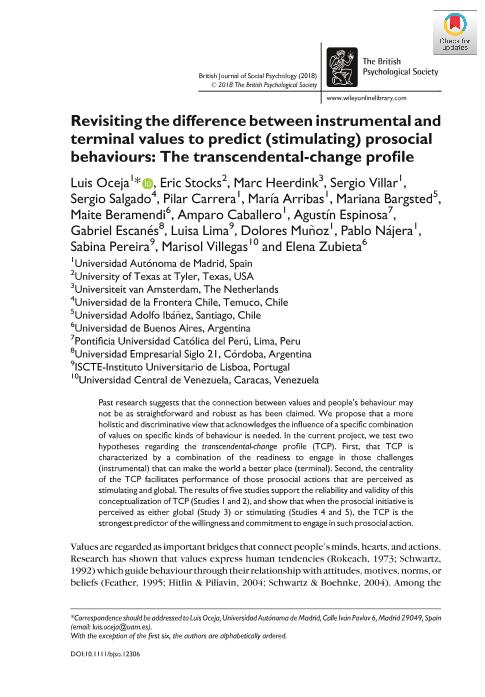Mostrar el registro sencillo del ítem
dc.contributor.author
Oceja, Luis
dc.contributor.author
Stocks, Eric
dc.contributor.author
Heerdink, Marc
dc.contributor.author
Villar, Sergio
dc.contributor.author
Salgado, Sergio
dc.contributor.author
Carrera, Pilar
dc.contributor.author
Arribas, María
dc.contributor.author
Bargsted, Mariana
dc.contributor.author
Beramendi, Maite Regina

dc.contributor.author
Caballero, Amparo
dc.contributor.author
Espinosa, Agustín
dc.contributor.author
Escanés, Gabriel Adrián

dc.contributor.author
Lima, Luisa
dc.contributor.author
Muñoz, Dolores
dc.contributor.author
Nájera, Pablo
dc.contributor.author
Pereira, Sabina
dc.contributor.author
Villegas, Marisol
dc.contributor.author
Zubieta, Elena Mercedes

dc.date.available
2022-11-24T18:28:10Z
dc.date.issued
2018-06
dc.identifier.citation
Oceja, Luis; Stocks, Eric; Heerdink, Marc; Villar, Sergio; Salgado, Sergio; et al.; Revisiting the difference between instrumental and terminal values to predict (stimulating) prosocial behaviours: The transcendental-change profile; John Wiley & Sons Ltd; British Journal of Social Psychology; 58; 3; 6-2018; 749-768
dc.identifier.issn
2044-8309
dc.identifier.uri
http://hdl.handle.net/11336/178887
dc.description.abstract
Past research suggests that the connection between values and people's behaviour may not be as straightforward and robust as has been claimed. We propose that a more holistic and discriminative view that acknowledges the influence of a specific combination of values on specific kinds of behaviour is needed. In the current project, we test two hypotheses regarding the transcendental-change profile (TCP). First, that TCP is characterized by a combination of the readiness to engage in those challenges (instrumental) that can make the world a better place (terminal). Second, the centrality of the TCP facilitates performance of those prosocial actions that are perceived as stimulating and global. The results of five studies support the reliability and validity of this conceptualization of TCP (Studies 1 and 2), and show that when the prosocial initiative is perceived as either global (Study 3) or stimulating (Studies 4 and 5), the TCP is the strongest predictor of the willingness and commitment to engage in such prosocial action.
dc.format
application/pdf
dc.language.iso
eng
dc.publisher
John Wiley & Sons Ltd

dc.rights
info:eu-repo/semantics/openAccess
dc.rights.uri
https://creativecommons.org/licenses/by-nc-sa/2.5/ar/
dc.subject
INSTRUMENTAL VALUES
dc.subject
PROSOCIAL ACTION
dc.subject
QUIXOTEISM
dc.subject
TERMINAL VALUES
dc.subject
TRANSCENDENTAL-CHANGE PROFILE
dc.subject.classification
Otras Psicología

dc.subject.classification
Psicología

dc.subject.classification
CIENCIAS SOCIALES

dc.title
Revisiting the difference between instrumental and terminal values to predict (stimulating) prosocial behaviours: The transcendental-change profile
dc.type
info:eu-repo/semantics/article
dc.type
info:ar-repo/semantics/artículo
dc.type
info:eu-repo/semantics/publishedVersion
dc.date.updated
2022-11-01T23:19:14Z
dc.identifier.eissn
0144-6665
dc.journal.volume
58
dc.journal.number
3
dc.journal.pagination
749-768
dc.journal.pais
Reino Unido

dc.journal.ciudad
Chichester
dc.description.fil
Fil: Oceja, Luis. Universidad Autónoma de Madrid; España
dc.description.fil
Fil: Stocks, Eric. University of Texas; Estados Unidos
dc.description.fil
Fil: Heerdink, Marc. University of Amsterdam; Países Bajos
dc.description.fil
Fil: Villar, Sergio. Universidad Autónoma de Madrid; España
dc.description.fil
Fil: Salgado, Sergio. Universidad de La Frontera; Chile
dc.description.fil
Fil: Carrera, Pilar. Universidad Autónoma de Madrid; España
dc.description.fil
Fil: Arribas, María. Universidad Autónoma de Madrid; España
dc.description.fil
Fil: Bargsted, Mariana. Universidad Adolfo Ibañez; Chile
dc.description.fil
Fil: Beramendi, Maite Regina. Universidad de Buenos Aires. Facultad de Psicología; Argentina. Consejo Nacional de Investigaciones Científicas y Técnicas; Argentina
dc.description.fil
Fil: Caballero, Amparo. Universidad Autónoma de Madrid; España
dc.description.fil
Fil: Espinosa, Agustín. Pontificia Universidad Católica de Perú; Perú
dc.description.fil
Fil: Escanés, Gabriel Adrián. Universidad Empresarial Siglo XXI; Argentina. Consejo Nacional de Investigaciones Científicas y Técnicas; Argentina
dc.description.fil
Fil: Lima, Luisa. Instituto Universitario de Lisboa; Portugal
dc.description.fil
Fil: Muñoz, Dolores. Universidad Autónoma de Madrid; España
dc.description.fil
Fil: Nájera, Pablo. Universidad Autónoma de Madrid; España
dc.description.fil
Fil: Pereira, Sabina. Instituto Universitario de Lisboa; Portugal
dc.description.fil
Fil: Villegas, Marisol. Universidad Central de Venezuela; Venezuela
dc.description.fil
Fil: Zubieta, Elena Mercedes. Universidad de Buenos Aires. Facultad de Psicología; Argentina. Consejo Nacional de Investigaciones Científicas y Técnicas; Argentina
dc.journal.title
British Journal of Social Psychology
dc.relation.alternativeid
info:eu-repo/semantics/altIdentifier/url/https://bpspsychub.onlinelibrary.wiley.com/doi/10.1111/bjso.12306
dc.relation.alternativeid
info:eu-repo/semantics/altIdentifier/doi/http://dx.doi.org/10.1111/bjso.12306
Archivos asociados
